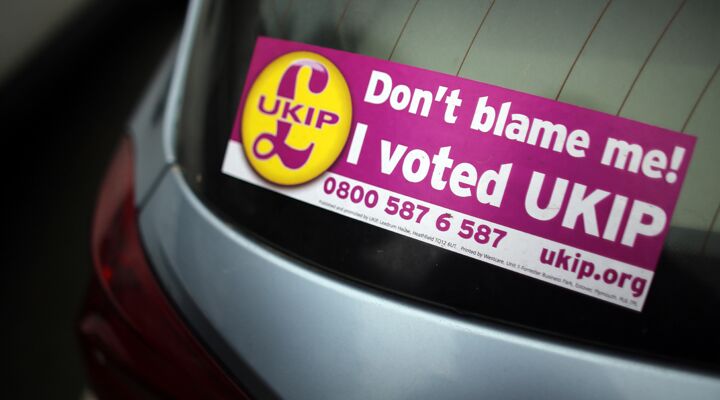
Anti-EU Feeling Shakes British Politics
The Euroskeptic UK Independence Party (ukip) shocked Britain’s political establishment by winning roughly one quarter of the vote in local elections held May 2.
Experts predicted a shift toward ukip, forecasting it to win 40 out of the nearly 2,400 seats available. But ukip outperformed even their most favorable forecasts, winning 147. Last time local elections were held in these regions in 2009, ukip won seven seats. That’s an increase of 2,100 percent.
Not all of the UK held local elections, so the bbc tried to estimate what this vote would mean on a national scale. Here’s what it came up with:
In years past, ukip has merely been lumped in with “other.” Now it’s a contender in its own right. This is the first time since World War ii that any party outside the three main ones has done so well.
Britain’s political pundits are having a field day trying to explain what this means for British politics, what effect it will have on the 2015 election and how the other parties will react. The answers to those questions are not clear, but it is obvious that a huge number are very concerned about Europe. As the Wall Street Journal put it: “What had been recently dismissed as a protest vote turns out to have been an attempt by a large portion of the British public to say something loud and clear.”
Or rather, they’re concerned about issues that relate to Europe. Only 59 percent of those who voted ukip said they did so because they want Britain out of the EU. But 76 percent said they chose ukip because they wanted to stop migration to Britain. Under EU rules, Britain has to allow anyone from the rest of the EU to come and live in Britain. Britain put temporary restrictions in place for some of the newer EU nations, but the last of these expire in 2014 when Bulgarians and Romanians will be allowed to move freely to Britain for the first time. Half a million Poles have already moved to England. Many worry about the effect that hundreds of thousands of Bulgarians and Romanians moving to the country could have.
Already the government is responding to pressure from ukip. Immigration was a central part of the Queen’s Speech, May 8, in which the government lays out its legislative agenda for the next year. The new laws introduce some measures to crack down on illegal immigrants and to restrict immigrants’ access to the National Health Service.
But ukip isn’t the only party forcing change on Britain’s position on Europe. The elder statesmen of the Conservative Party are also speaking out. Nigel Lawson, the former pro-EU chancellor of the exchequer who served under Margaret Thatcher from 1983 to 1989, called for Britain to leave the EU in an article in the Times on May 7. The change of heart from a senior Conservative could help shift the whole party into a more Euroskeptic position.
A YouGov poll conducted by the Times found that 46 percent of voters want to leave the EU, 35 percent want to stay and 20 percent aren’t sure.
As the EU shifts toward becoming a superstate, it becomes clearer every day that Britain wants no part of it. It is only a matter of time before it parts ways, as the Trumpet has forecast all along.
